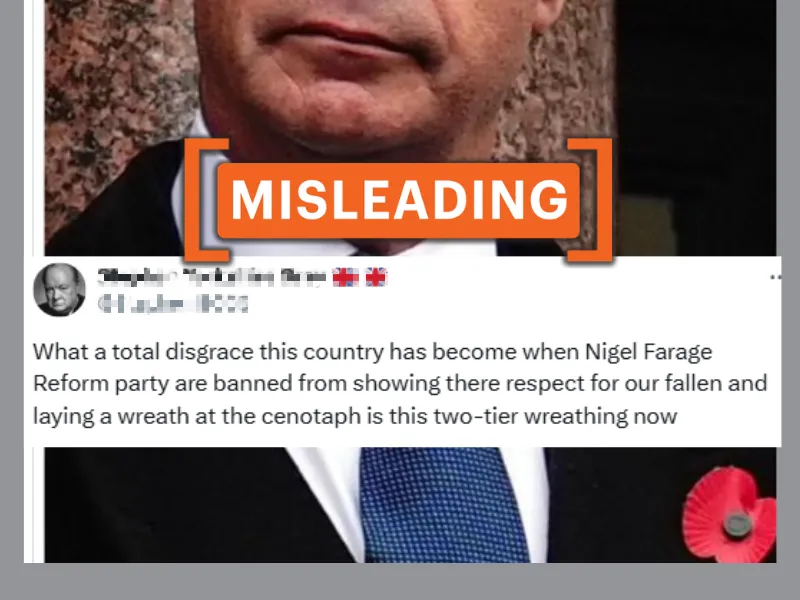By: Siri Christiansen
November 12 2024
 A screenshot of a post making the claim. (Source: X/Screenshot/Modified by Logically Facts)
A screenshot of a post making the claim. (Source: X/Screenshot/Modified by Logically Facts)
A 1984 formula governs which parties can lay a wreath at the Cenotaph. This does not target Reform U.K. specifically.
The claim
Following the annual Remembrance Day service at the Cenotaph war memorial in London, U.K., social media users incorrectly claimed Reform U.K. leader Nigel Farage had been banned or blocked from laying a wreath by "the establishment."
"So, the slimy traitor, Starmer is allowed to lay a wreath, but a patriot, Nigel Farage isn't," one Facebook user wrote (archived here).
"What a total disgrace this country has become when Nigel Farage Reform party are banned from showing there [sic] respect for our fallen," one X user lamented in a post (archived here), which had 197,000 views.
Other social media users argued that it was incorrect to allow DUP leader Gavin Robinson to lay a wreath, considering his party has as many Westminster seats as Reform U.K.
"Blatant bias! The hypocrit [sic] is not even trying to hide it now!" another Facebook user wrote (archived here).
In fact
Prime Minister Sir Keir Starmer, Conservative leader Kemi Badenoch, Liberal Democrat leader Sir Ed Davey, Scottish National Party (SNP) Westminster leader Stephen Flynn, and Democratic Unionist Party (DUP) leader Gavin Robinson laid a wreath at the Cenotaph in Westminster on Sunday, November 10, 2024.
The wreath commemorated the British and Commonwealth service members who died in the two World Wars and later conflicts in an annual service known as the National Service of Remembrance.
Reform U.K. party leader Nigel Farage and the Green Party's co-leader Carla Denyer watched the ceremony from the balconies.
The reason Reform U.K. was excluded from the wreath ceremony predates the party's existence.
A formula from 1984 stipulates that only leaders from parties that have won more than six parliamentary seats at Westminster can lay wreaths at the Cenotaph. This explains why Green Party co-leader Denyer was not invited to lay a wreath, either – the party has only four seats, and Reform U.K. five.
The only exception to this rule applies to the parties with the most sitting MPs from each of the devolved nations (Scotland, Northern Ireland, and Wales), which are allowed to lay a wreath even if they occupy fewer than six seats.
While Sinn Féin is the Northern Ireland party with the most seats in Westminster, the nationalist party refuses to occupy the seats. This means that the DUP, the Northern Irish party with the second-most Westminster seats, was allowed to participate.
"Following a change to the parliamentary protocol to ensure all four home nations can be represented at the service of remembrance, the Democratic Unionist Party laid a wreath at The Cenotaph," a spokesperson for the Department of Culture, Media, and Sport, which is responsible for coordinating invitations to the Cenotaph ceremony, told Logically Facts.
Several relevant people and offices agreed to this change, including the Speaker, the Prime Minister's Office, the Northern Ireland Office, the Chief Whip, and the Royal Household.
Several outlets, including GB News and the Telegraph, have explained these rules when reporting Farage's comments. The rules were also brought to public attention in 2015 when the U.K. Independence Party (UKIP) urged the Queen to allow the party to participate in the Cenotaph event.
The verdict
Farage and Reform U.K. were not banned from laying a wreath at the Cenotaph — the party lacks the number of Westminster seats needed to be represented, similar to the Green Party. This rule predates Reform U.K., and while it does exclude the party, it cannot be said to target Reform U.K. specifically.
Therefore, we have rated the claim as misleading.